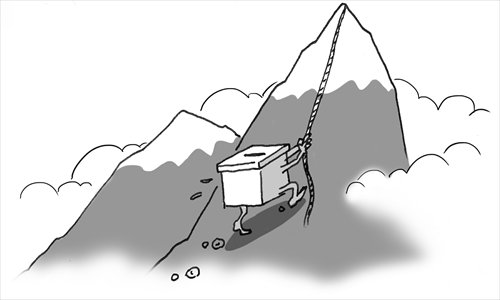Myanmese military’s soft coup indicates trend in upcoming elections

Illustration: Liu Rui/GT
Myanmar's ruling Union Solidarity and Development Party (USDP) sacked chairman Thura U Shwe Mann and general secretary Maung Maung Thein on Thursday. The abrupt changes, which were made only three months prior to the general election, are like a bloodless coup.
Shwe Mann is the biggest hopeful in the upcoming elections, and his removal was announced after the military had blockaded USDP headquarters and his house. Based on the history of Myanmar's political transition, the coup will very likely have a definitive impact on the elections.
The coup is believed to have been triggered by conflicts inside the USDP. According to the law, August 14, one day after the coup, was the deadline for the registration of parliamentary candidates. Shwe Mann had a major conflict with President U Thein Sein and the military over the USDP's candidates. Among the 1,147 USDP candidates nominated by Shwe Mann, quite a few who were backed by Thein Sein and the military were excluded from the list. Thus, Shwe Mann's removal seems to have been inevitable.
In addition, Shwe Mann's premature statement in which he allied himself with opposition leader Aung San Suu Kyi got on the military's nerves.
Since Myanmar started its democratic reform in 2010, it has been in the spotlight. Releasing political prisoners, relaxing media restrictions, lifting the ban on political parties and certain social organizations - all these efforts have made Myanmar a new democratic yardstick in Asia lauded by most Western countries. US President Barack Obama also sees Myanmar's breakthrough as his diplomatic legacy.
The unchained Myanmese media has dealt a blow to the "former military junta," which soon became the target of public accusations. The military and the USDP bear the brunt of criticisms because they represent the "junta."
Shwe Mann seems willing to meet the demands of the people and get rid of the political burden. So he announced cooperation with Suu Kyi in a bid to co-lead the democratic process.
For example, in the matter of the constitutional amendment, Shwe Mann was Suu Kyi's wingman in parliament and tried to dilute the military's leverage. Such actions have clearly disrupted the military politically and touched on their nerves. Military countermeasures are only a matter of time.
The ousting of Shwe Mann shows that the military still dominates the country, and reveals one important feature of Myanmar's political transformation - "the gun commands the party."
The USDP will speed up its efforts to influence the elections, making sure the party and the military are able to make full use of their resources, by means of re-arranging constituencies and making the election rules.
The military seems to have considered the worst scenario. In the elections, there is going to be a three-way competition among the alliance of the USDP and the military, the Suu Kyi-led opposition National League for Democracy (NLD), and the alliance of ethnic minority forces. If the NLD wins the election, it will be the worst result for the military. It is possible that the military will deliberately worsen the situation in northern Myanmar and declare a nationwide military control, so the NLD will have to face more hurdles to be in power.
The NLD and the ethnic minorities will face further pressure imposed by the military, so the result of the election might strike a tripartite balance. The soft coup last week aims at unifying the ruling party and suppressing the popularity of the NLD and the ethnic minorities. A tripartite balance is the bottom line for the military.
As long as there is no real reconciliation between the central government and the ethnic minorities, the military will continue using the situation in northern Myanmar as leverage, and the gun-commands-party conundrum will remain. The country's democratic process is bound to experience more ups and downs.
As one of the longest-ruling militaries in Asia, the Myanmese military should realize where its destiny lies.
The author is a senior research fellow at the National Institute of International Strategy at the Chinese Academy of Social Sciences. opinion@globaltimes.com.cn